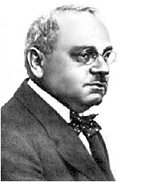By Alex Gordon


HAIFA, Israel — Alfred Adler was born in a wealthy suburb of Vienna to a Jewish family of grain merchants on February 7, 1870. He was the second of six children. As a child, Adler had several near-death experiences. When Alfred was three years old, his younger brother died in the crib where they slept together. In addition, twice Adler was nearly killed in street accidents, and at age five he suffered severe pneumonia. The family doctor considered the case hopeless, but another doctor managed to save the boy. After this story, Adler decided to become a doctor.
In his youth, Adler was very fond of reading. Subsequently, his good acquaintance with literature, the Bible, psychology and German classical philosophy brought him popularity in Viennese society and later world fame as a lecturer.
At the age of 18, Adler entered the University of Vienna to study medicine. At the university he became interested in the ideas of socialism and participated in several political meetings. At one of them he met his future wife, Raisa Epstein, a student from Russia who was studying at the university. By the end of his studies, Adler had become a convinced Social Democrat. In 1895, Adler earned a medical degree. He began practicing first as an ophthalmologist, then as a general practitioner. Later, he became interested in neurology and psychiatry.
In 1901, Adler spoke out in the press against attacks on Freud’s Interpretation of Dreams, published in 1899. Freud invited him to join the circle he led, which then consisted of only five members, including Freud himself and Adler. Adler became a member of the circle in 1902. At the first meetings with Freud. Adler tried to impose on him the books of Marx and Engels, but he dryly replied: “Dr. Adler, the class struggle can not be engaged in. It takes a lifetime to win the struggle of the sexes.”
In December 1897, Adler married Epstein, a supporter and acquaintance of Trotsky, whose friendship was testified to by Freud’s student and biographer Ernst Jones. They had four children, Valentina (1898), Alexandra (1901), Kurt (1905), and Nelly (1909). Alexandra and Kurt became, like their father, psychiatrists. Valentina was a Communist International activist who worked at the Foreign Workers’ Publishing House in Moscow and was repressed for supporting Trotskyism. In 1897, Adler was baptized into Lutheranism.
In 1907, Adler’s first psychoanalytic publication Inferiority of Organs was published. On October 12, 1910, Adler was elected president of the Vienna Psychoanalytic Society and co-editor (Freud was editor) of the psychoanalytic journal Zeitschrift für Psychoanalyse.
Adler was a leader, a thinker, and too creative a person to be content with a subordinate role. All his life he suffered in rebellion against his older brother, who was sickly and therefore received special attention from his mother. He wanted to be first. He consistently rejected Freudian analysis, the Oedipus complex and the sexual etiology of neuroses.
Adler interpreted psychoanalysis in his own way. He preferred to view the libido as purely psychic energy, not necessarily related to instincts. These differences ended in a break with Freud, resigning as president of the Vienna Society of Psychoanalysts and as editor of the journal. He was extremely ambitious and constantly quarreled over the priority of his ideas. He did not want to work under Freud. Together with his supporters, he founded the Society for Free Psychoanalysis. For two years, Adler served as a military doctor on the Russian front, and returning to Vienna in 1916, headed a military hospital.
In 1917, Adler’s work The Cognition of People was published, and three years later the programmatic work Practice and Theory of Individual Psychology. Adler called his theory “individual psychology.” “Individual psychology” rejects Freud’s three fundamental principles: biological determinism, the sexual etiology of mental disorders, and the dominant motivational role of the unconscious in the life of the individual. It follows from Adler’s concept that human activity is conditioned by the future, not by the past, as orthodox psychoanalysis believes.
In 1919, with the support of the Austrian government, Adler organized the first children’s rehabilitation clinic. A few years later, there were already about 30 such clinics in Vienna, staffed by Adler’s students. The staff of each clinic consisted of a doctor, a psychologist and a social worker. Adler’s work became internationally renowned. Similar clinics soon appeared in England, Switzerland, Holland, France, Austria, and Germany, then in the United States. In 1922, the publication of the journal previously interrupted by the war was resumed under a new name, the International Journal of Individual Psychology.
In 1926, Adler was invited to take up a professorship at Columbia University in New York. Upon learning that Adler had been invited to America, Freud quipped: “Probably the purpose of this is to save the world from sexuality and build it on aggression.” Adler traveled extensively, lecturing around the world. On May 28, 1937, he died of a heart attack in Aberdeen, Scotland.
Adler’s “individual psychology” is as follows. He believed that nervous disease is a disturbance in the balance of the organism’s relationship with its environment, which the organism seeks to compensate for. Adler said: “To be a complete person, one must have an inferiority complex. Inferiority is a normal, natural feeling for a person. […] The feeling of inferiority is not abnormal in itself. It is the cause of all improvements in the condition of mankind.” He considered the basic motive of human behavior to be the desire for self-assertion and personal superiority as compensation for the childhood feeling of inferiority. It is this goal that becomes the center of personality formation and the definition of its psyche. The nature of this goal and its realization create a person’s specific “life style.”
The urge, according to Adler, to compensate for feelings of inferiority is reinforced by innate aggressiveness. Jones wrote, “[Adler] went to the extreme and interpreted all things in terms of Nietzsche’s will to power. Even the sexual act itself was motivated not so much by sexual desire as by pure aggression. […] The concepts of displacement, of child sexuality, and even of the unconscious itself were thrown out of use, so that little remained of psychoanalysis.” The psychologist identified the concept of aggression with initiative and the ability to overcome obstacles. He regarded aggression and the will to power as a generalized motive of the “desire for superiority.”
If the personality is in conflict with the environment, it is not a matter of love hunger or sexual displacement, as Freudians insisted, but of an insatiable urge to dominion. Every human being is inherent in the urge to dominate, to subjugate others, but under certain circumstances this quality acquires a painful bias, and then the neurosis of approval of one’s own personality is played out.
A person of low stature sometimes tries to walk on tiptoe, wearing high heels, pulls up his head, trying to speak in a sonorous voice, just to seem higher, outwardly more significant in comparison with his or her capabilities.
A shy, weak person, in order to compensate for his defects, begins an intense struggle to appear strong – a kind of struggle for power: “to be at the top of life, not at the bottom of it.” A person from early childhood is made a tyrant of others, loved ones, tries to subjugate others with affection, or his own suffering. With the help of headaches, vomiting, and upset stomach, choking, intimidation of loved ones can lord it over them.
Adler did not need to recognize the existence of the unconscious, did not work to decipher the unconscious, and did not seek to overcome the resistance of the patient, as Freud demanded. For Adler, the structure of the illness was clear from the beginning without analyzing individual moments from the past.
Adler was an outstanding lecturer and had an aphoristic style of expression:
“It is always easier to fight for one’s principles than to live up to them.”
“The only normal people are the ones you don’t know very well.”
“To be human means to feel inferior”.
His life was a vivid embodiment of his “individual psychology,” from his childhood inferiority complex to his aggressive drive for superiority and dominance.
*
Alex Gordon is professor emeritus of physics at the University of Haifa and at Oranim, the Academic College of Education, and the author of 11 books.